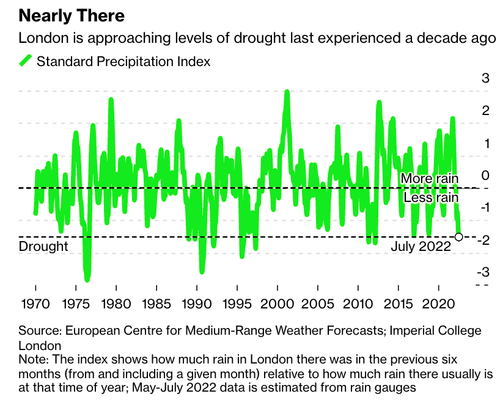SOURCE:
UK Water Restrictions Go Into Effect As Heatwave Persists | ZeroHedge
Britain has recorded one of its hottest and driest summers on record. Rivers and reservoirs are drying up as towns in the southern part of the country imposed the first hosepipe ban on Friday.
The country's record heat in July -- above 104 Fahrenheit (40 degrees Celsius) -- melted airport runways, buckled train tracks, and shuttered transportation networks, as London's fire brigade said it had one of the busiest days since World War II. The heat dome resulted in dozens of building structure fires and wildfires.
As of 1700 local time Friday, Hampshire and the Isle of Wight residents will be placed under emergency water restrictions called "temporary use ban." If residents water their gardens, yards, and/or clean their vehicles, they could face a stiff penalty of up to $1,200 (£1,000). A similar ban will go into effect for residents in Kent and Sussex from Aug. 12.
"Months of sparse rainfall, combined with record-breaking temperatures in July, have left rivers at exceptionally low levels, depleted reservoirs and dried-out soils," British newspaper The Independent wrote.
London dodged the water restrictions for now as its large reservoirs are at "very comfortable levels," Barnaby Dobson, a research associate on the Community Water Management for a Liveable London project at Imperial College London, told Bloomberg.
However, water reservoirs in London could slump as the metro area faces levels of drought not seen in a decade.
Dobson said rationing is a measure of last resort and would come after hosepipe bans. He said water utilities are very wary of implementing water rationings because it would trigger consumer backlash.
Utilities have other options such as tapping emergency aquifers — rock formations that hold groundwater — or old reservoirs that are no longer in use but still have some water in them. They could also convince the UK's Environment Agency to let them take more water out of the river to avoid any kind of rationing — although that risks resource depletion and other environmental concerns, Dobson said.
"Part of our current issue with low water levels leading to measures like hosepipe bans is that we still think of this as a wet country, treating water as an infinite resource," Christine Colvin, advocacy and engagement director at The Rivers Trust, said.
Private water company Southern Water warned: "We know that we've had the driest July in the southeast since 1891, the temperatures have been really high, people have been using more water."
Across Europe, this season, drought and dried rivers have emerged in countries like Germany, which has caused economic disruption.
